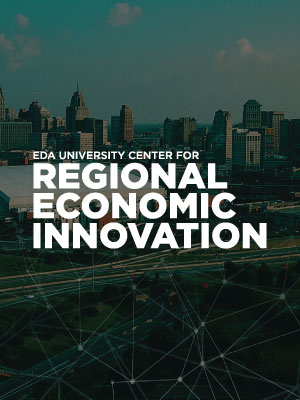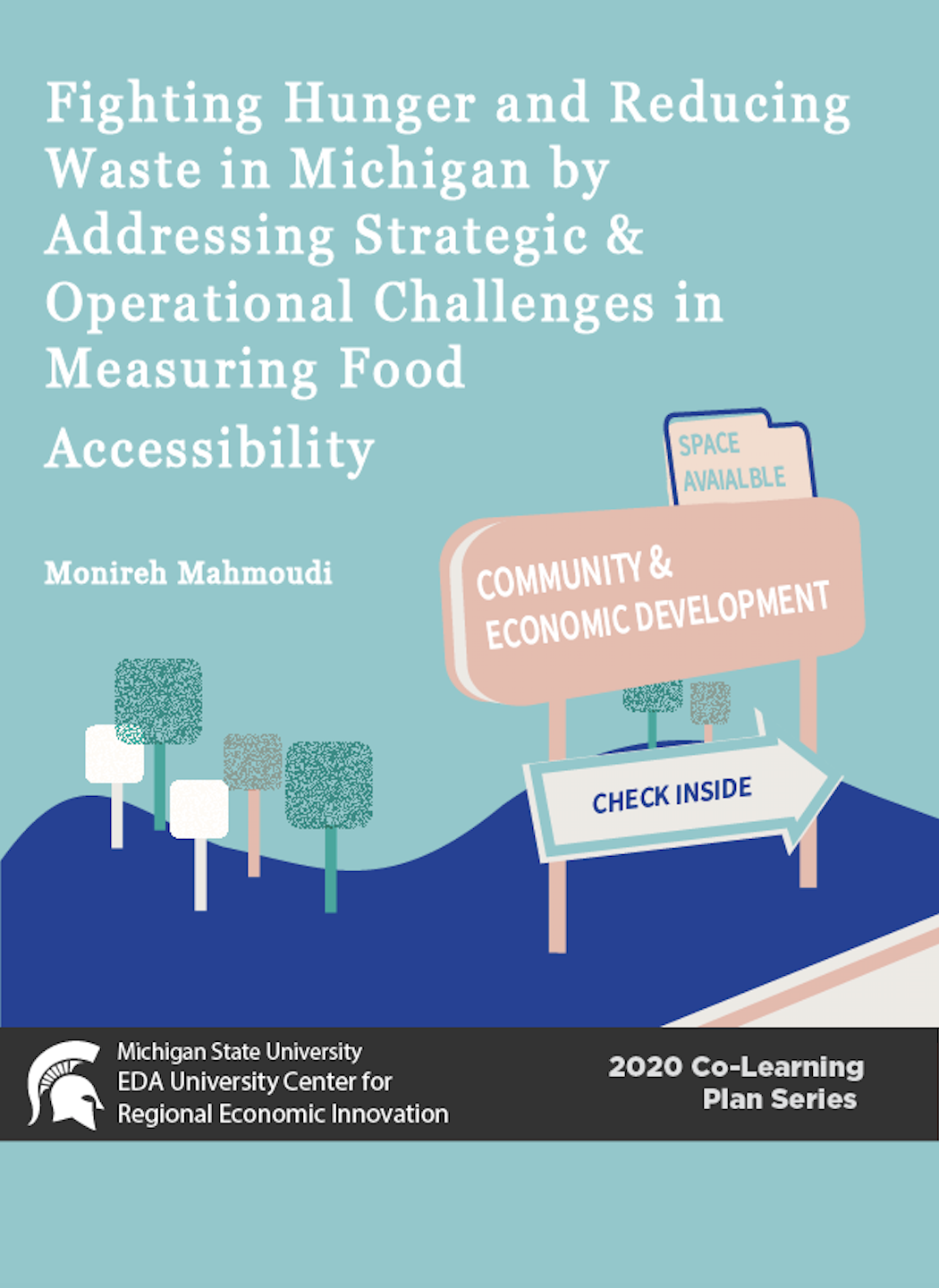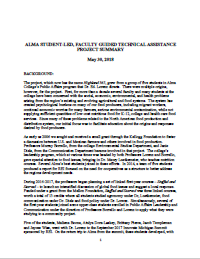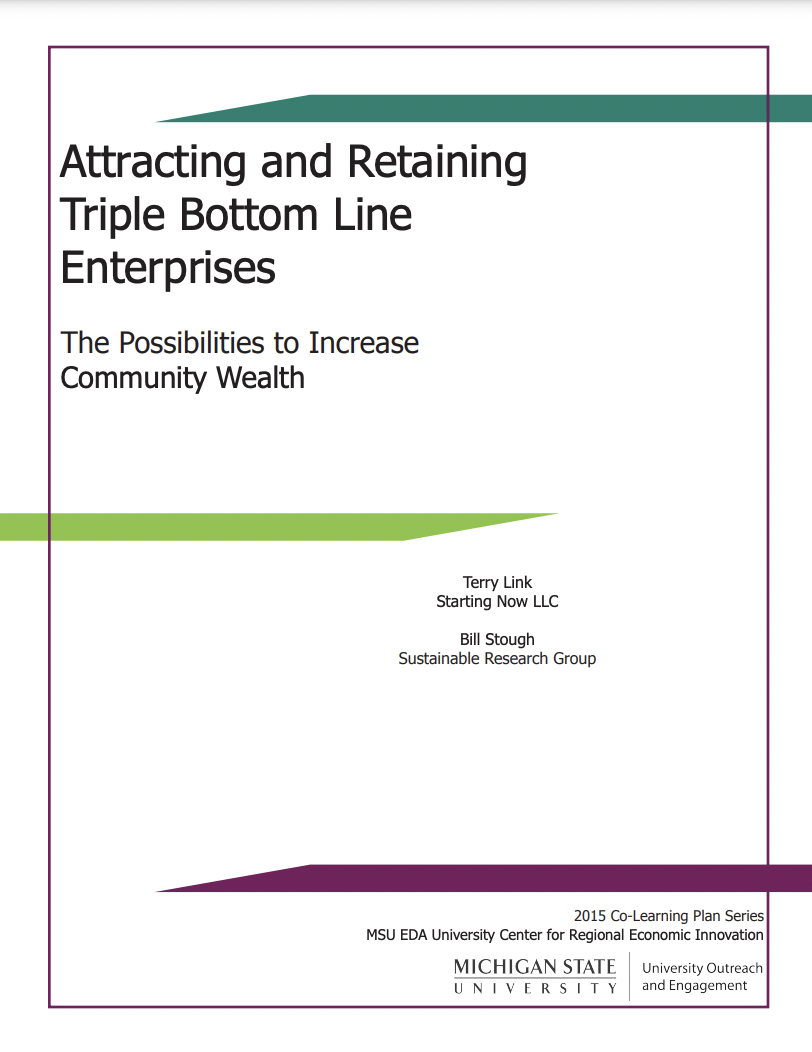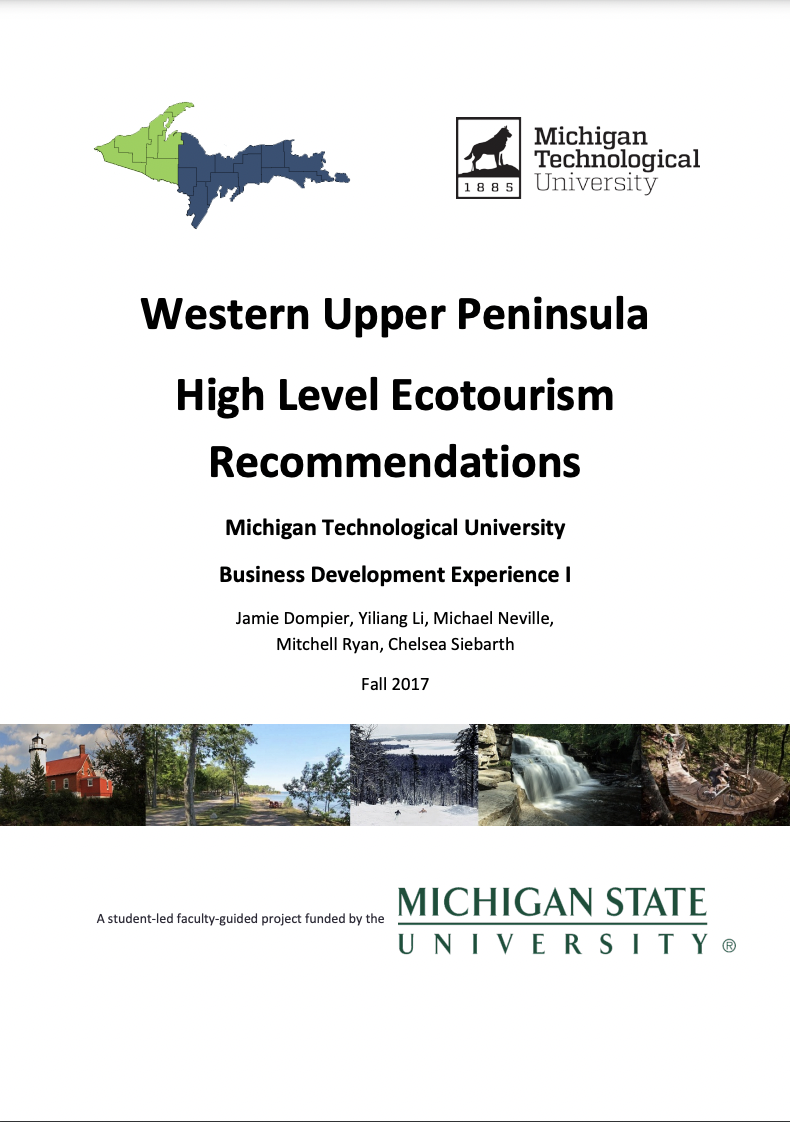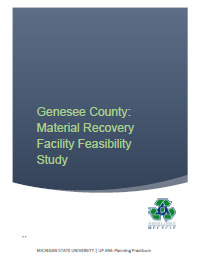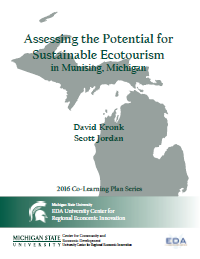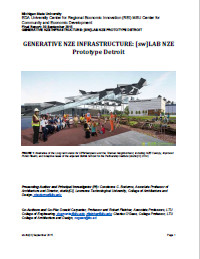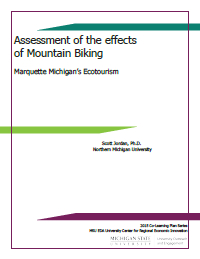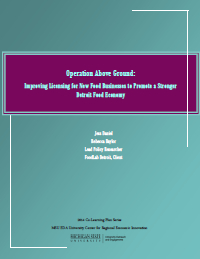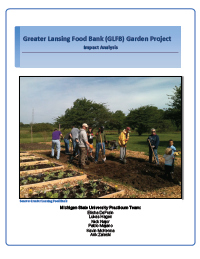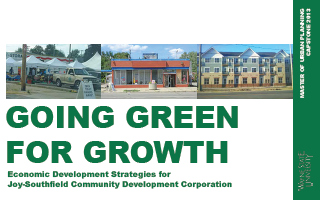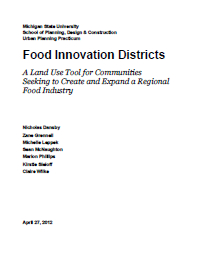Discovering and applying new and innovative economic development tools, models, policies, and programs
Creating Jobs and Wealth in Distressed Michigan Communities
Green and Food
-
2025: Addressing Agricultural Workforce and Infrastructure Shortages through Innovation Centers
Author(s): Tom SmithRead the Report About the ProjectThis project aims to address agricultural labor shortages and infrastructure challenges in Michigan by proposing the development of agricultural innovation centers. These centers would coordinate existing resources, such as private sector expertise, university research, and career and technical education, to provide training and support for a well-prepared domestic workforce. The project involves researching models of agricultural innovation centers from other regions, identifying relevant Michigan stakeholders, and drafting a tailored organizational structure for the state. Stakeholder feedback will refine the plan, which will be shared through networks established during the project. Ultimately, the project will identify the various existing stakeholders needed for agriculture innovation centers and develop and design the organizational structure and coordination to develop these centers.
-
2024: Flint Farm Film – Post H2O Crisis
Author(s): MSU Student Filmmakers and recent graduates, guided by School of Journalism Faculty Geri Alumit Zeldes and Troy Hale.Read the Report About the ProjectThis SLFG project will create a documentary film that will be an epilogue to The Kings of Flint" (2011) and "Flint River Farm” (2012). The crew will interview Dora King of King’s Youth Karate-Ka studio and Urban Farm and Roxanne Adair of Flint River Farm” the central characters of these two films. The new film will make clear the legacies of those pioneering farmers and how they influence the newer farmers in the city. Like the previous films, this new documentary will explore environmental justice, the human right to fresh food and how farming builds community. The films, released two years before the Flint Water Crisis that began in 2014, showed the early challenges and achievements the urban farmers in Flint faced. With the Water Crisis and the COVID-19 pandemic in the rear-view mirror, what new challenges lay deep in the soil?
The film tells the story of urban farming in Flint hit hard by the Water Crisis and the COVID pandemic that further ravaged a city already devastated by the economy. This film, like the films released prior to the Flint Water Crisis, will frame the urban farming movement as a potential “sustainable infrastructure” for a city built on the automobile. Farming is a vehicle for economic development and a model of a circular economy that begins with planting, harvest, use, composting and regeneration.
-
2022: Creating Circular Economic Opportunities through Localizing the Food Cooperative
Author(s): Dr. Stephen GasteyerRead the Report About the ProjectThis applied research study will use the development of a reimagined consumer food cooperative, in coalition with a neighborhood community-based organization, to develop a circular food economy in mid-Michigan that improves the prospects for local food producers and improves the local food access and security. The innovation of this proposal is in the literature on local economic development. Specifically, it will be reviewed: 1) consumer food co-ops, an alternative model that has often prioritized access to high-quality foods for middle-class clientele, be transformed to a model that both supports local agri-food producers and local food access and security; 2) how can this model address the development of a regional circular economy that improves quality of life for local residents, especially in the context of a legacy city, and; 3) what are the opportunities and constraints of supporting local food systems and product economy through building a model that circulates financial capital? 4) what are the assets that will make this model work?
-
2021: Indigenous Food and Economic Systems for Michigan Tribes
Author(s): Jessica V. Barnes-NajorRead the Report About the ProjectThis pilot project will expand the work of Wiba Anung, a partnership between the Inter-Tribal Council of Michigan and representatives from Michigan State University (MSU). The MSU representatives, Dr. Barnes-Najor and Ms. Saucedo, will lead the research effort in partnership with Mrs. Schulte, Ms. Cameron, and Mrs. Martin from ITC-MI. With the support of this grant, Ms. Saucedo will conduct a Photovoice project to explore community members perceptions of how colonization has disrupted Native food systems, how these disruptions have contributed to economic and health disparities, and how tribes could support a return to locally produced and traditional foods. Using a framework developed in partnership with colleagues at MSU (K. Isaacs & C. Wentworth Fournier), the Wiba Anung team will examine local issues related to the intersections of social, economic, food, and health inequities from the lens of tribal members using Photovoice methodology.
In addition to this conceptual framework, the proposed project is grounded in community-based participatory research (CBPR) and Tribal-Participatory Research (TPR). CBPR is defined as “systematic inquiry with the participation of those affected by an issue to education and action for social change” (Minkler & Wallerstein, 2003). TPR is similar in concept, but more clearly describes the process of co-generation of knowledge with Native communities (Fisher and Ball, 2003). TPR also recognizes the unique nature of conducting research in sovereign nations within the U.S. borders. These participatory processes allow for unexplored economic and health topics to be conducted in collaboration with Native communities.
The information gathered will be used by the Wiba Anung team to develop a report that identifies mechanisms to support existing tribally developed infrastructures for including Native and local food production within local tribal economies and ensure that the infrastructures increases community member access to Indigenous and local foods. The team will work directly with the REI University Center team to revise and finalize the Co-learning plan. In addition to the report, the team will develop a document outlining a plan to explicitly connect the Indigenous food-based economic systems with tribal education. This connection will increase utilization of Indigenous food-based economic systems while also increasing family access to healthy foods. The team will share findings with participating tribal administrators and community groups through live presentations upon conclusion of the pilot study. Infographics and videos showcasing findings from the Photovoice project will be shared with community members via social media after the findings have been shared with tribal administrators. The team will ensure all products generated are accessible and Section 508 compliant.
-
2020: Fighting Hunger and Reducing Waste in Michigan by Addressing Strategic and Operational Challenges in Measuring Food Accessibility
Author(s): Monireh MahmoudiRead the Report About the ProjectThe aim of this project is to eliminate food waste by making excess food accessible for people in need. A food donor (e.g., a farm, a retailer, or a catering) donates some food to a food bank. Then, the food bank will quickly decide to send the food to distribution agencies or to composting facilities. For this decision making, the food bank should consider various factors such as environmental (e.g., harsh weather conditions), physical (e.g., personnel and mobility resources), social (e.g., recipients’ food restrictions due to various cultural and religious backgrounds), and economic (e.g., monetary budgets). We develop an analytical framework that can provide an applicable guideline for food banks to decide about the final destination of the donated food (with respect to the availability of the resources, as well as quality, volume and type of donated food). This can result in a significant cost-saving and improve the accessibility of people in need to excess food.
-
2018: Big-Box Converted to Co-op
Author(s): Edward C. Lorenz, Alma CollegeRead the Report About the ProjectAn Alma College student team plans to work with the local community to convert an abandoned 'big-box' retail location (K-Mart) to a year round fresh vegetable and fruit production facility. Launching a cooperative controlled by local consumers and workers will benefit both urban and rural poor in the region.
-
2018: Agricultural Technological Innovation in Michigan
Author(s): Terri Barker, Michigan Department of Agriculture and Rural DevelopmentAbout the ProjectAgriculture is Michigan’s second largest industry and with its proximity to the automotive industry and burgeoning biosciences and Information Technology sectors, the State is poised for food and agriculture technological innovation. Currently, resources for food and ag technology are siloed, the aim of this Co-Learning Plan is to work with stakeholders to identify and collect the materials needed to develop this sector. The completed report will provide immediate support for growing businesses and a blueprint for stakeholders interested in developing this sector.
-
2017: Triple Bottom Line
Author(s): Bill Stough, Sustainable Research GroupRead the Report About the ProjectIn regions of the state where entrepreneurial innovation is more established, the emergence of the Triple Bottom Line business model is driving growth of companies that are decidedly place-based, pay better wages and prefer purchasing local goods and services. This innovative business trend implies a shift from the current focus of reducing the negative impacts of economic activity to the deliberate generation of positive impacts. It is the goal of this REI Fellows initiative to actively introduce and help implement the TBL approach in the East Central Michigan region consisting of: Clare, Gladwin, Arenac, Bay, Midland, Isabella, Gratiot and Saginaw counties. Although not widely described as a disadvantaged community, this 8-county region has an average ALICE rating that indicates 43.25% of the population live below income levels needed to achieve minimal living standards. Bill Stough, President of Sustainable Research Group, will be leading this Innovation Fellowship.
Project Updated As Of September 30th, 2017
-
2017: Ecotourism in the UP
Author(s): Jonathan Lenonien, Michigan Technological UniversityRead the Report About the ProjectA student research team at Michigan Tech researched and developed an inventory of the Upper Peninsula's eco-tourism resources and gaps. They compared these with similar successful eco-tourism regions and suggested a stronger business model.
Project Updated As Of September 30th, 2017
-
2016: North Flint Healthy Food Initiative
Author(s): Kettering University; Bob Brown, Michigan State UniversityRead the Report About the ProjectThe project creates a self-sustainable, resident-owned aquaponic system in the West Pulaski neighborhood of Flint that allows neighbors to work together to improve their well-being. The aquaponic will be used to grow foods that mitigate the effects of lead poisoning in people, especially children. The aquaponic system will be built into a house owned by the Block Club and maintained by themselves for themselves. This first Aquahouse is a demonstration project to understand product yields, value to residents, and potential for additional aquaponic projects around Flint.
Project Updated As Of September 30th, 2016
-
2016: Hybridized Ecosystem for Infrastructure and Renewable Systems
Author(s): Lawrence Technological UniversityRead the Report About the ProjectThis initiative, led by a transdisciplinary design collaborative, studio[Ci] was now in the implementation phase. Studio[Ci] engages students in more diverse leadership roles, advances through generative design and digital fabrication, the HNZE prototype structure and canopy, and attracts additional partners and in-kind contributions. At the end of the construction period, the team sought to have a fully functional HNZE solar/water harvesting prototype from which they could collect data and evaluate with the community, including energy/power and water collection and distribution, enhanced public realm, and training and educational opportunities for the youth and adults of the Tireman Neighborhood. The HNZE prototype was a first, catalytic act to achieve the long-term vision of making the neighborhood NZE (taking it "off the grid"). In collaboration with MIT School of Architecture and Planning faculty and students, the team confirmed the replicability and scalability of the canopy, and conducted a financial and economic feasibility study for a collectivized micro grid - a neighborhood energy district cooperatively owned and managed by residents.
Project Updated As Of September 30th, 2016
-
2016: Genesee County Material Recovery Facility Feasibility Study
Author(s): Michigan State UniversityRead the Report About the ProjectTo reduce the overall amount of waste in Genesee County, this project will examine the feasibility of establishing a regional recycling facility in the area.
Project Updated As Of September 30th, 2016 -
2016: An Assessment of the Development of a Sustainable Ecotourism Alliance Organization for Munising
Author(s): Scott Jordan and David Kronk, Northern Michigan UniversityRead the Report About the ProjectAn Assessment of the Development of a Sustainable Ecotourism Alliance Organization for Munising (2016)
This Co-Learning Plan examines the economic effects and sustainability potential of the creation of a Sustainable Ecotourism Alliance Organization (SEAO) in Munising to establish a fully functioning and recognized "Ecotourism" community in the state of Michigan. Munising is located in Michigan's North Central Upper Peninsula on the South Shore of Lake Superior and directly adjacent to Pictured Rocks National Lakeshore and Hiawatha National Forest. With summer visitation up 97% from 2011, there is an urgent need for more local service providers (lodging and food) and policies to limit harmful impacts on the local environment (USFS 2015). SEAO, a highly successful model originally used in Costa Rica, is meant to better organize the industry by setting sustainable standards that benefit the local community.
Project Updated As Of September 30th, 2016
-
2015: Generative NZE Infrastructure
Author(s): Constance C. Bodurow, Lawrence Technological UniversityRead the Report About the Projectsw[LAB] NZE Prototype creates a new Hybridized Ecosystem––an Energy Farm/Outdoor Classroom (EF/OC) for a Detroit public school and surrounding neighborhood. Our vision engages the community and leverages assets of a strong institutional presence, vacancy, and diverse partners in order to generate energy, wealth and educational opportunities. Balancing economic, environmental and social values, our project links the school and neighborhood through net zero energy (NZE) landscape and infrastructure networks/structures.
Project Updated As Of September 30th, 2015
-
2015: An Assessment of the Effects of Mountain Biking in Marquette and on Michigan's Ecotourism Economy
Author(s): Scott Jordan, Ph.D., Northern Michigan UniversityRead the Report About the ProjectMountain biking is an ecotourism activity that has been growing in popularity across the country and especially in Michigan. As interest in mountain biking has increased, a number of individuals and organizations have contributed in developing and expanding the trail systems in and around Marquette. Marquette is situated among the hills and valleys of Michigan's North Central Upper Peninsula on the south shore of Lake Superior. This area became an epicenter for mountain biking due to local investment in the development of a trails system offering riding experiences for all levels of cyclists. Advancement of the trails system was intended to create superb riding as well as to create a cycling economy. This analysis examined the economic effects and sustainability that the sport of mountain biking has on the Marquette area of Michigan's Upper Peninsula and on the state of Michigan.
Project Updated As Of September 30th, 2015
-
2014: Operation Above Ground: Improving Licensing for New Food Businesses to Promote a stronger Detroit Food Economy
Author(s): Jess Daniel, FoodLab DetroitRead the Report About the ProjectThis Co-Learning Plan provided research and a visual mapping of the current licensing process for five new and alternative models of food business to take the first step in removing a significant barrier to the emergence of a more diverse, thriving, healthy, and innovative food economy in Detroit.
Project Updated As Of September 30th, 2014
-
2014: Greater Lansing Food Bank Garden Project
Author(s): Elisha DeFrain, Lukas Hagen, Nick Major, Pablo Majano, Kevin McKenna, Arick Zaleski, Michigan State UniversityRead the Report About the ProjectThis Student-Led, Faculty-Guided Project developed a tool to measure the impact of community gardening in urban areas through a survey system and examination of the area. This information provides valuable insights on how to effectively manage community resources to their greatest benefit.
Project Updated As Of September 30th, 2014
-
2013: Socioeconomic Impact of Urban Gardening
Author(s): Aaron Guay, Julie PulginiRead the Report About the ProjectA documentary film on the socioeconomic impact of Urban Gardening/Small Scale Farming initiatives in Detroit. Using a documentary cinematic process as the medium, students focused on three communities which qualify as underserved and are involved in Urban Gardening and/or small scale urban farming initiatives to determine the need, vision and scope of the initiative. This was done through interviews with local gardeners/farmers, government officials, and other civic leaders, who are currently dealing with the issues that underserved communities are confronting.
Project Updated As Of September 30th, 2013
-
2013: Cody-Rouge: Going Green for Growth
Author(s): Rayman Mohamed, Robin Boyle, Wayne State UniversityRead the Report About the ProjectJoy-Southfield CDC's goal was to create a healthy community that is known as the greenest neighborhood in Detroit. This project focused on improving the economic health of the community in two ways. It developed a short-range strategy to advance the CDC's on-going efforts to develop a commercial section of Joy Road into an attractive, pedestrian-friendly district that offers an array of retail opportunities. The CDC also wants to attract green industry to the neighborhood's main industrial area, work it has begun recently. The project examined specific green industries to assess which would be most likely to come, and to offer jobs opportunities for community residents.
Project Updated As Of September 30th, 2013
-
2012: Food Innovation Districts
Author(s): Nicholas Dansby, Zane Grennel, Michelle Leppek, Sean McNaughton, Marlon Phillips, Kirstie Sieloff, Claire Wilke, Michigan State UniversityRead the Report About the ProjectThe goal of this project was to bring together the planning and economic development tools that communities would need to designate spaces for farmers, retailers, distributors, processors, and other services, such as community kitchens, to locate near one another in ways that would serve both individual consumers and larger institutional buyers. Part of the project involved specifically defining a food innovation district.
Project Updated As Of September 30th, 2012



